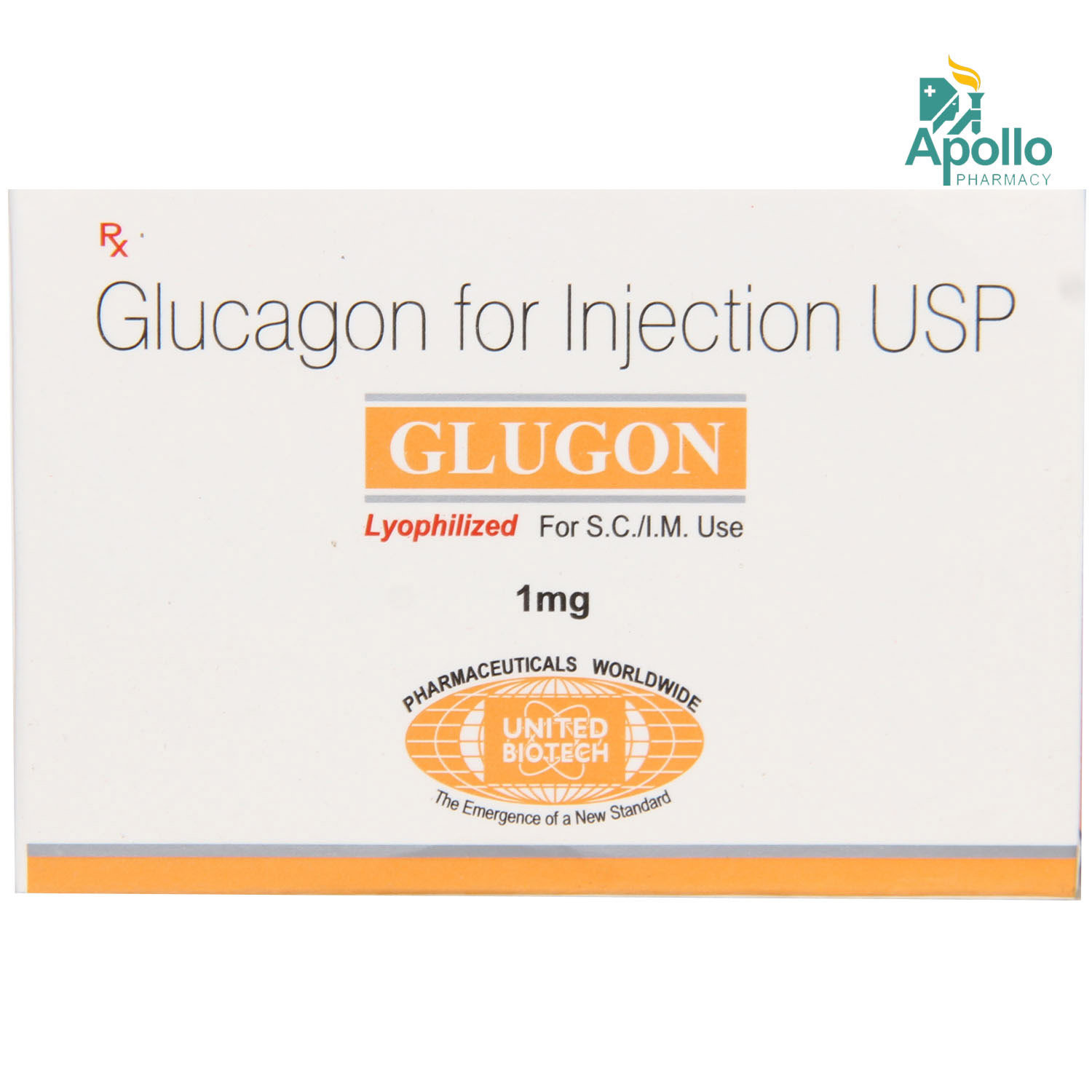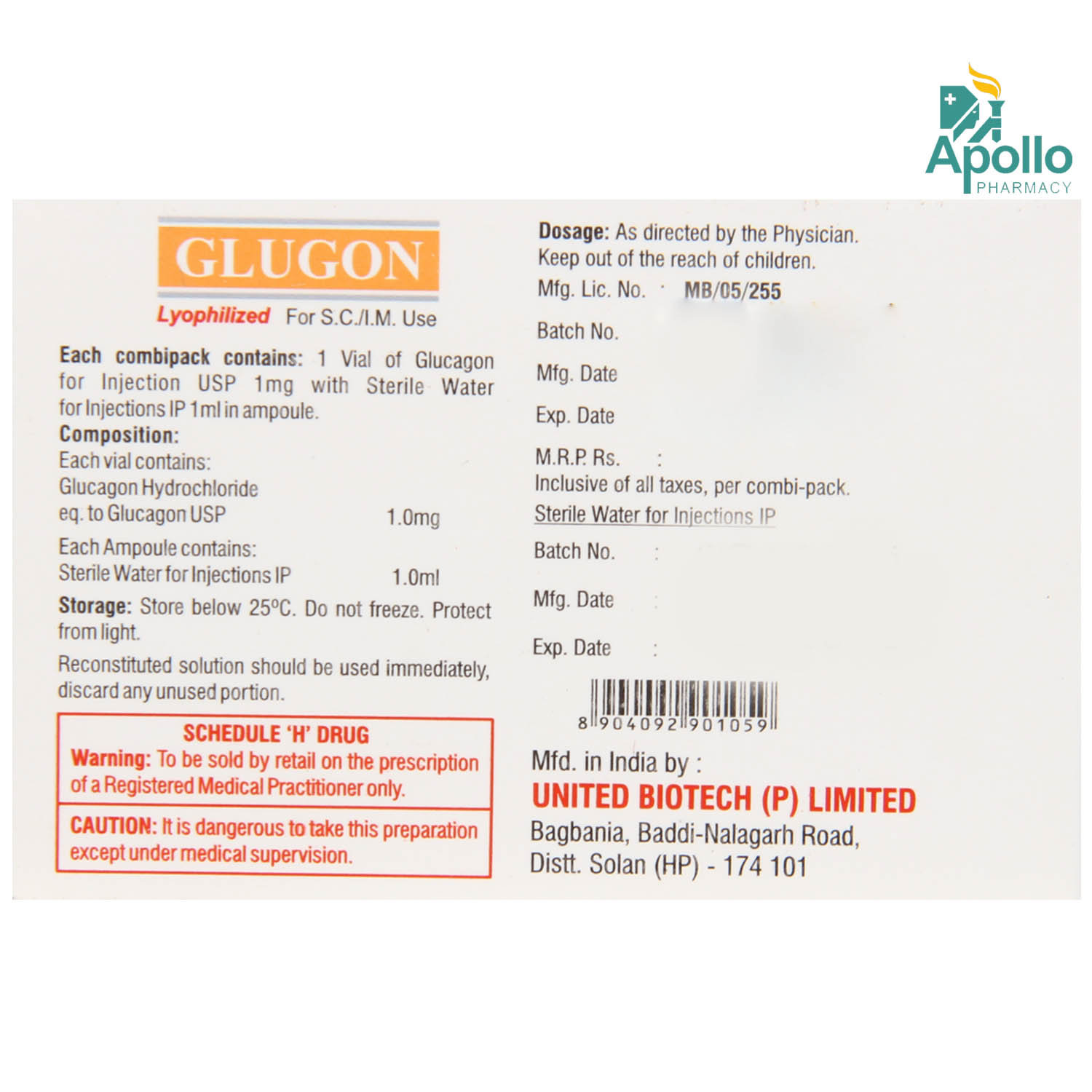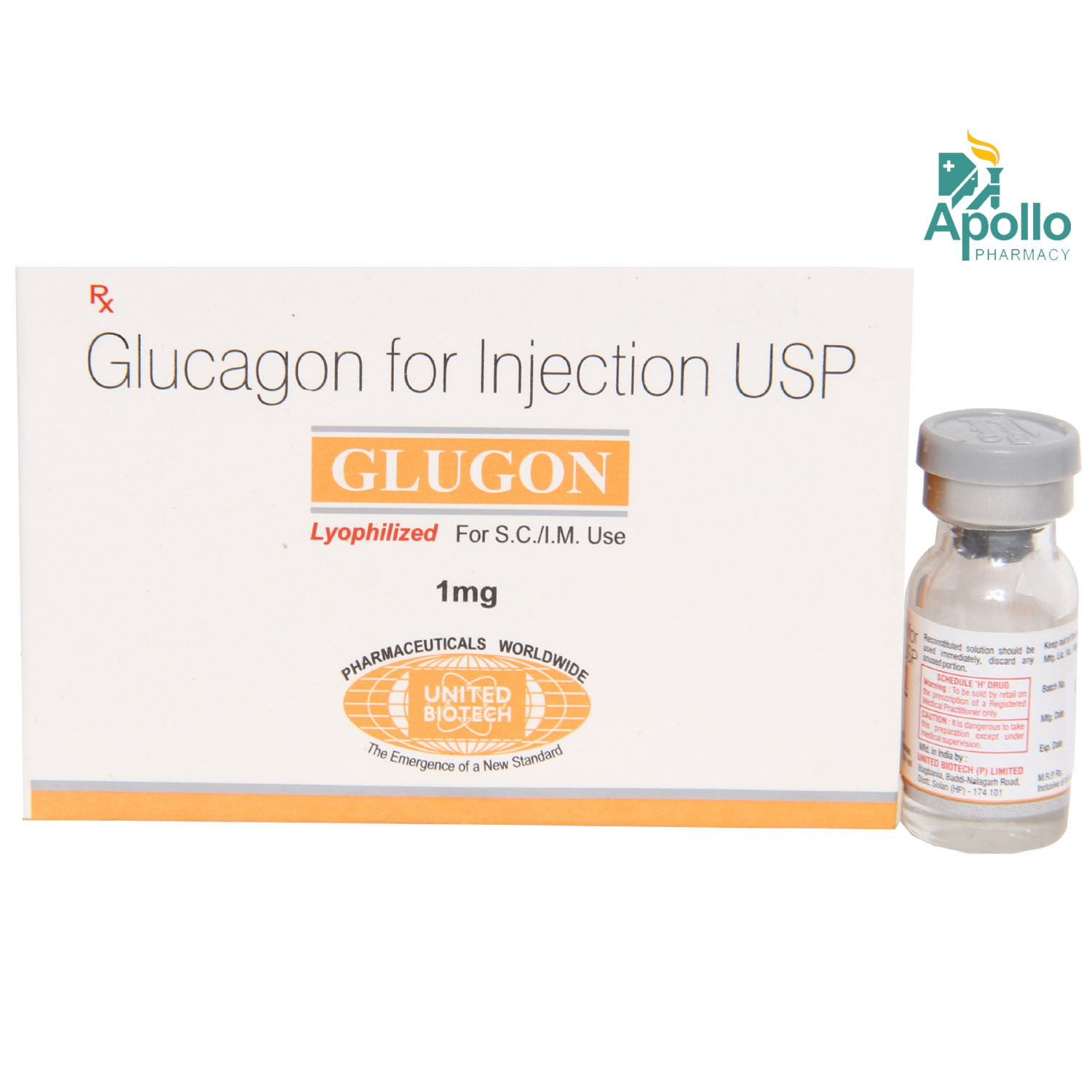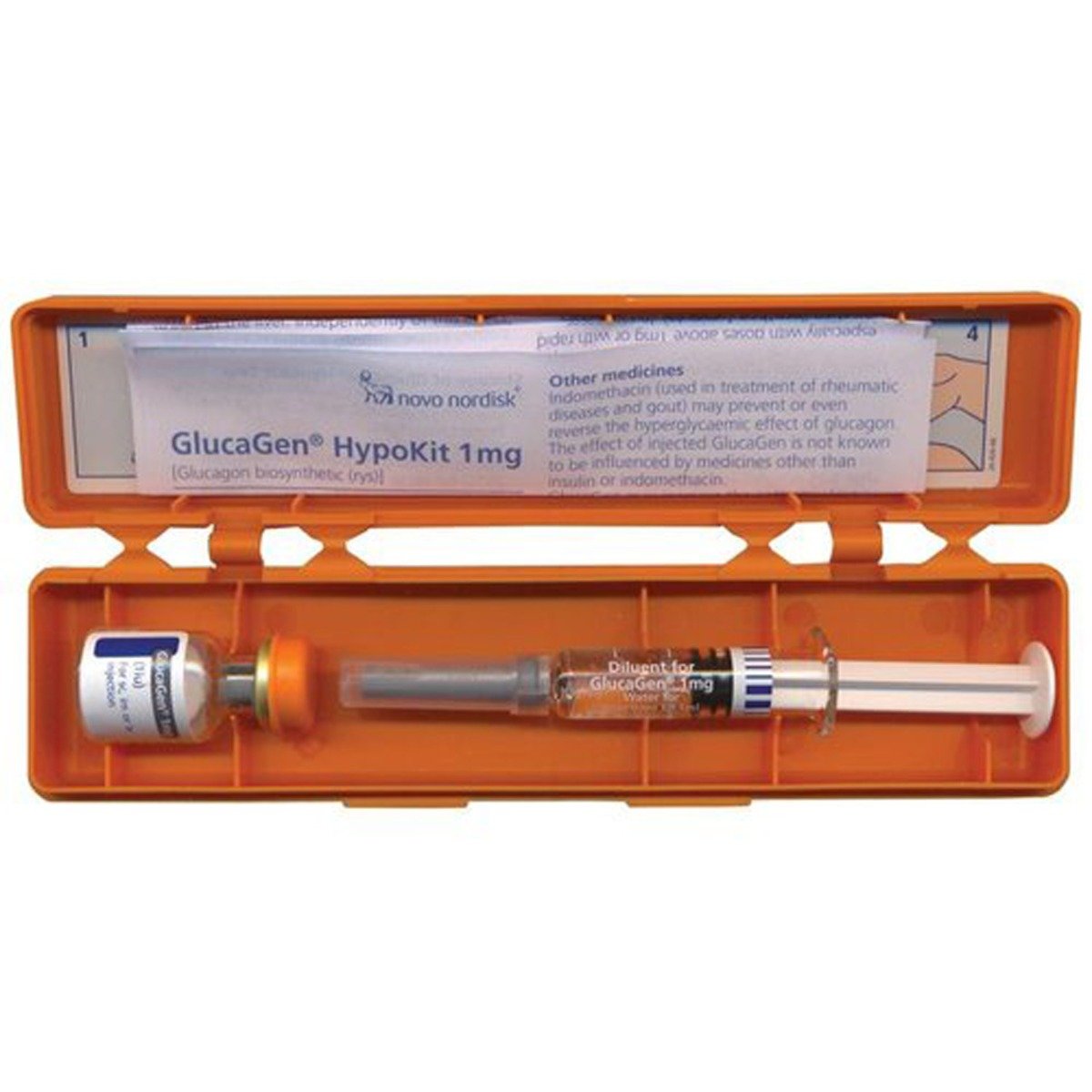Glugon 1 mg Injection 1's
MRP ₹1347
(Inclusive of all Taxes)
₹67.3 Cashback (5%)
Provide Delivery Location
Online payment accepted
 Prescription drug
Prescription drugWhats That
Composition :
Manufacturer/Marketer :
Consume Type :
Expires on or after :
Return Policy :
About Glugon 1 mg Injection
Glugon 1 mg Injection belongs to a class of medications called hormones used to treat severe hypoglycemia (low blood sugar) in diabetic patients. Severe hypoglycemia is defined as low blood glucose levels which require assistance from another drug to treat. It is an emergency condition that requires immediate medical attention and occurs in diabetic people taking insulin and other anti-diabetic medicines.
The Glugon 1 mg Injection contains Glucagon which works by helping the liver convert glycogen into glucose (sugar) which is then released into the bloodstream. Thus, Glugon 1 mg Injection helps in increasing blood sugar levels.
Take Glugon 1 mg Injection as prescribed by your doctor. You are advised to take Glugon 1 mg Injection for as long as your doctor has prescribed it for you based on your medical condition. In some cases, you may experience vomiting, nausea, and swelling at the injection site. Most of these side effects of Glugon 1 mg Injection do not require medical attention and gradually resolve over time. However, if the side effects persist or worsen, please consult your doctor.
If you are allergic to Glugon 1 mg Injection or any other medicines, please tell your doctor. If you are pregnant or breastfeeding, please inform your doctor before taking Glugon 1 mg Injection. Use Glugon 1 mg Injection with caution in children and doses only as advised by a doctor. Avoid alcohol consumption with Glugon 1 mg Injection as it may cause low blood sugar levels. Inform your friends and family that you are taking Glugon 1 mg Injection and show them how to administer Glugon 1 mg Injection so that if you become unconscious, they will be able to immediately inject Glugon 1 mg Injection.
Uses of Glugon 1 mg Injection
Directions for Use
Key Benefits
The Glugon 1 mg Injection contains Glucagon which helps the liver convert glycogen into glucose (sugar) which is then released into the bloodstream. Thus, the Glugon 1 mg Injection increases blood sugar levels. Also, Glugon 1 mg Injection may be used to stop stomach movements during X-ray examinations to diagnose certain stomach or intestine disorders.
Storage
- Hydrate your body: Drink enough water to prevent dehydration and headaches.
- Calm Your Mind: Deep breathing and meditation can help you relax and relieve stress.
- Rest and Recharge: Sleep for 7-8 hours to reduce headache triggers.
- Take rest: lie down in a quiet, dark environment.
- Cold or warm compresses can help reduce tension.
- Stay Upright: Maintain good posture to keep symptoms from getting worse.
- To treat headaches naturally, try acupuncture or massage therapy.
- Over-the-counter pain relievers include acetaminophen and ibuprofen.
- Prescription Assistance: Speak with your doctor about more substantial drug alternatives.
- Severe Headaches: Seek emergency medical assistance for sudden, severe headaches.
- Frequent Headaches: If you get reoccurring headaches, consult your doctor.
- Headaches with Symptoms: Seek medical attention if your headaches include fever, disorientation, or weakness.
- Inform your doctor about the nausea and discuss possible alternatives to the medication or adjustments to the dosage.
- Divide your daily food intake into smaller, more frequent meals to reduce nausea.
- Opt for bland, easily digestible foods like crackers, toast, plain rice, bananas, and applesauce.
- Avoid certain foods that can trigger nausea, such as fatty, greasy, spicy, and smelly foods.
- Drink plenty of fluids, such as water, clear broth, or electrolyte-rich beverages like coconut water or sports drinks.
- Use ginger (tea, ale, or candies) to help relieve nausea.
- Get adequate rest and also avoid strenuous activities that can worsen nausea.
- Talk to your doctor about taking anti-nausea medication if your nausea is severe.
- Record when your nausea occurs, what triggers it, and what provides relief to help you identify patterns and manage your symptoms more effectively.
- Preventing Vomiting (Before it Happens)
- Take medication exactly as prescribed by your doctor. This can help minimize side effects, including vomiting.
- Having a small meal before taking your medication can help reduce nausea and vomiting.
- Talk to your doctor about taking anti-nausea medication along with your prescribed medication.
- Managing Vomiting (If it Happens)
- Try taking ginger in the form of tea, ale, or candy to help alleviate nausea and vomiting.
- What to Do if Vomiting Persists
- Consult your doctor if vomiting continues or worsens, consult the doctor for guidance on adjusting your medication or additional treatment.
Drug Warnings
If you are allergic to Glugon 1 mg Injection or any other medicines, please tell your doctor. If you have low adrenaline levels, a tumor that releases insulin or glucagon, or low blood sugar caused due to excessive alcohol, inform your doctor before taking Glugon 1 mg Injection. If you are pregnant or breastfeeding, please inform your doctor before taking Glugon 1 mg Injection. Use Glugon 1 mg Injection with caution in children and doses only as advised by a doctor. Avoid alcohol consumption with Glugon 1 mg Injection as it may cause low blood sugar levels. Do not skip meals and avoid too much exercise. Inform your friends and family that you are taking Glugon 1 mg Injection and show them how to administer Glugon 1 mg Injection so that if you become unconscious, they will be able to immediately inject Glugon 1 mg Injection.
Drug-Drug Interactions
Drug-Drug Interactions
Login/Sign Up
Scopolamine can decrease the effects of Glugon 1 mg Injection on the digestive system. This increases the risk or severity of side effects.
How to manage the interaction:
There may be a possibility of interaction between Scopolamine and Glugon 1 mg Injection, but it can be taken if prescribed by a doctor. However, if you experience symptoms like Severe constipation, Diarrhea, Stool incontinence, or Severe abdominal pain call a doctor. Do not stop using any medications without a doctor's advice.
Aclidinium can decrease the effects of Glugon 1 mg Injection on the movement of the digestive system. This can increase the risk or severity of side effects.
How to manage the interaction:
There may be a possibility of interaction between Aclidinium bromide and Glugon 1 mg Injection, but it can be taken if prescribed by a doctor. However, if you experience symptoms like Severe constipation, Diarrhea, Stool incontinence, or Severe abdominal pain call a doctor. Do not stop using any medications without a doctor's advice.
Benzatropine can make Glugon 1 mg Injection less effective in moving the digestive system. This increases the risk or severity of side effects.
How to manage the interaction:
Although taking Benzatropine and Glugon 1 mg Injection together can cause an interaction, it can be taken if your doctor has suggested it. However, if you experience symptoms like Severe constipation, Diarrhea, Stool incontinence, or Severe abdominal pain call a doctor. Do not stop using any medications without a doctor's advice.
Drug-Food Interactions
Drug-Food Interactions
Login/Sign Up
Diet & Lifestyle Advise
- Eat smaller meals every 3-4 hours throughout the day.
- Do not skip regular meals.
- If a meal is delayed, have a carbohydrate form like bread.
- Include vegetables, fruits, plant foods, sources of lean protein in your diet.
- Avoid foods rich in trans fats or saturated fats.
- Limit or avoid refined and processed sugars from your diet.
- Avoid the consumption of alcohol, especially after exercise.
Side Effects of Glugon 1 mg Injection
- Vomiting
- Nausea
- Swelling at the injection site
- Increased heart rate
- Sweating
Habit Forming
Therapeutic Class
All Substitutes & Brand Comparisons
RX
Out of StockGlucon 1 mg Injection 1's
United Biotech Pvt Ltd
₹785
(₹706.5 per unit)
44% CHEAPERRX
Glucagen HypoKit 1mg Injection
Novo Nordisk India Pvt Ltd
₹990
(₹891.0 per unit)
30% CHEAPERRX
Out of StockGlucagon 1 mg Injection 1's
United Biotech Pvt Ltd
₹990
(₹891.0 per unit)
30% CHEAPER
Author Details
We provide you with authentic, trustworthy and relevant information
Drug-Diseases Interactions
Drug-Diseases Interactions
Login/Sign Up
FAQs
Glugon 1 mg Injection contains Glucagon that helps liver to convert glycogen into glucose (sugar) which is then released into the blood stream. Thus, Glugon 1 mg Injection increases blood sugar levels.
You are not recommended to take Glugon 1 mg Injection with warfarin as it may increase the risk of bleeding more easily. However, please consult a doctor before using Glugon 1 mg Injection with other medicines so that the dose may be adjusted appropriately or alternate medicine may be prescribed.
Glugon 1 mg Injection should be used with caution in children and doses as advised by a doctor only.
You recommend avoiding taking Glugon 1 mg Injection if you have a tumour of the adrenal gland (pheochromocytoma) or pancreas (insulinoma) and allergic to lactose or glucose.
Glugon 1 mg Injection may cause high blood pressure and increase pulse as temporary effects. However, if it lasts for a long time or worsens, please consult a doctor.
Drug-Drug Interactions Checker List
- INSULIN
- WARFARIN
- INDOMETHACIN
Special Advise
It is advised to give the patient snacks containing high sugars such as biscuits, sweets, or fruit juice as soon as they regain consciousness and can swallow to prevent low blood sugar from occurring again.
Disease/Condition Glossary
Hypoglycemia: It is defined as low blood glucose levels which require assistance from another person to treat. It is an emergency condition that requires immediate medical attention and occurs in diabetic people taking insulin and other anti-diabetic medicines. The symptoms include loss of consciousness, fits, confusion or intense nightmares while asleep. The risk of severe hypoglycemia in diabetic patients increases if the regular meal is delayed or missed, insulin overdose, alcohol intake, or exercise is done without proper medication reduction.

Have a query?
Alcohol
Safe if prescribed
You are recommended to avoid consumption of alcohol with Glugon 1 mg Injection as it may cause low blood sugar levels.
Pregnancy
Consult your doctor
Glugon 1 mg Injection is a Category B pregnancy drug and is given to pregnant women only if the doctor thinks benefits outweigh risks. Please consult a doctor if you are pregnant or planning for pregnancy.
Breast Feeding
Consult your doctor
It is unknown whether Glugon 1 mg Injection is excreted in human milk. Please consult a doctor before using Glugon 1 mg Injection if you are breastfeeding mother.
Driving
Safe if prescribed
Drive only if you are alert after taking Glugon 1 mg Injection.
Liver
Consult your doctor
If you have any concerns regarding the use of Glugon 1 mg Injection in patients with liver problems, please consult a doctor.
Kidney
Consult your doctor
If you have any concerns regarding the use of Glugon 1 mg Injection in patients with kidney problems, please consult a doctor.
Children
Safe if prescribed
Glugon 1 mg Injection should be used in children only as advised by a doctor.













